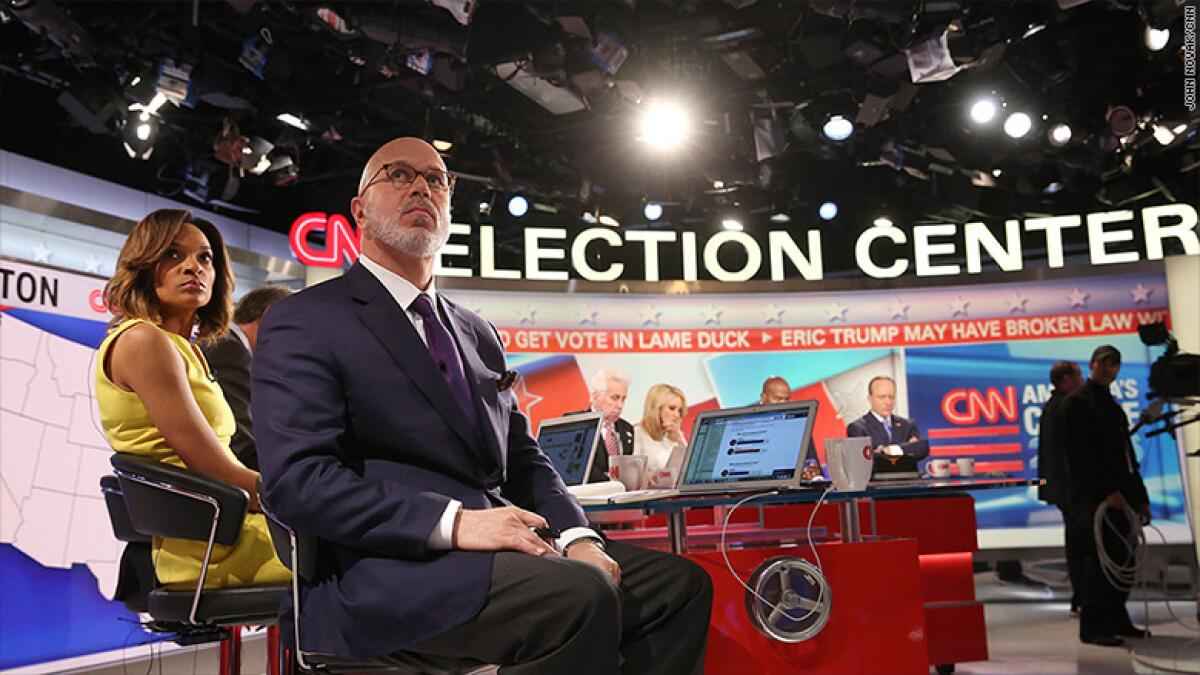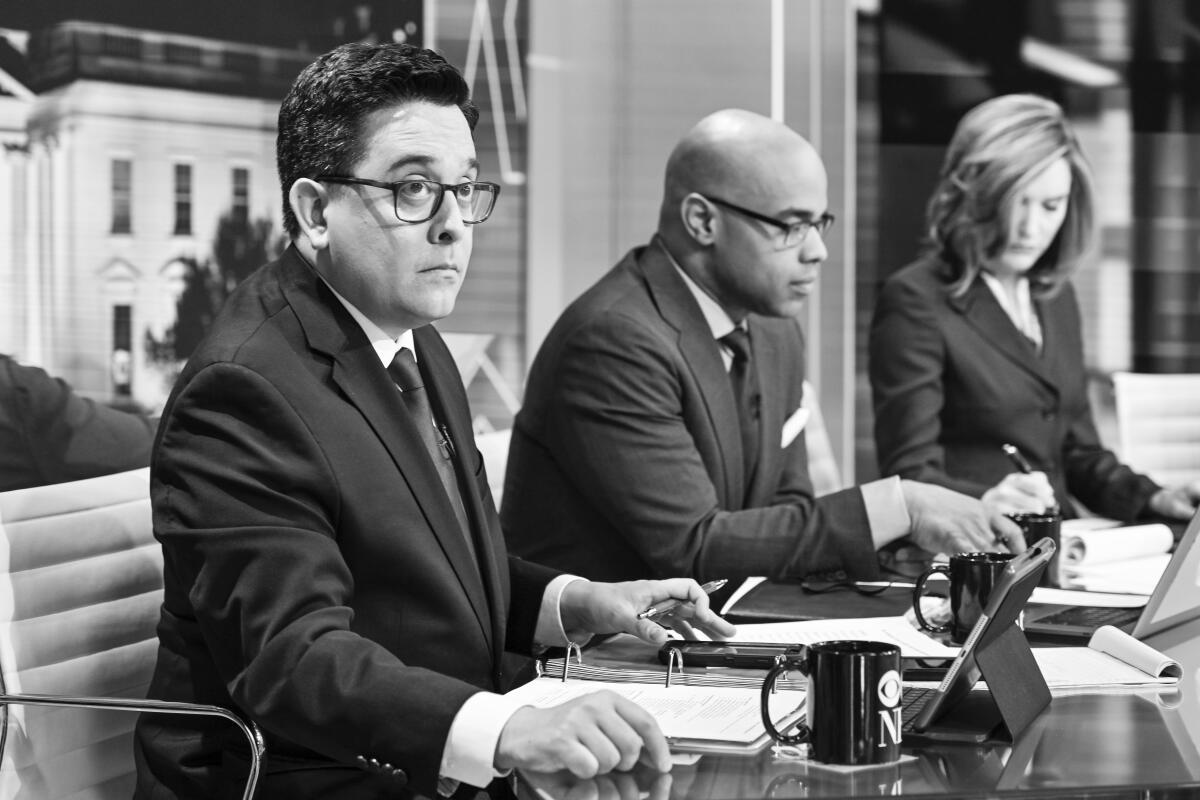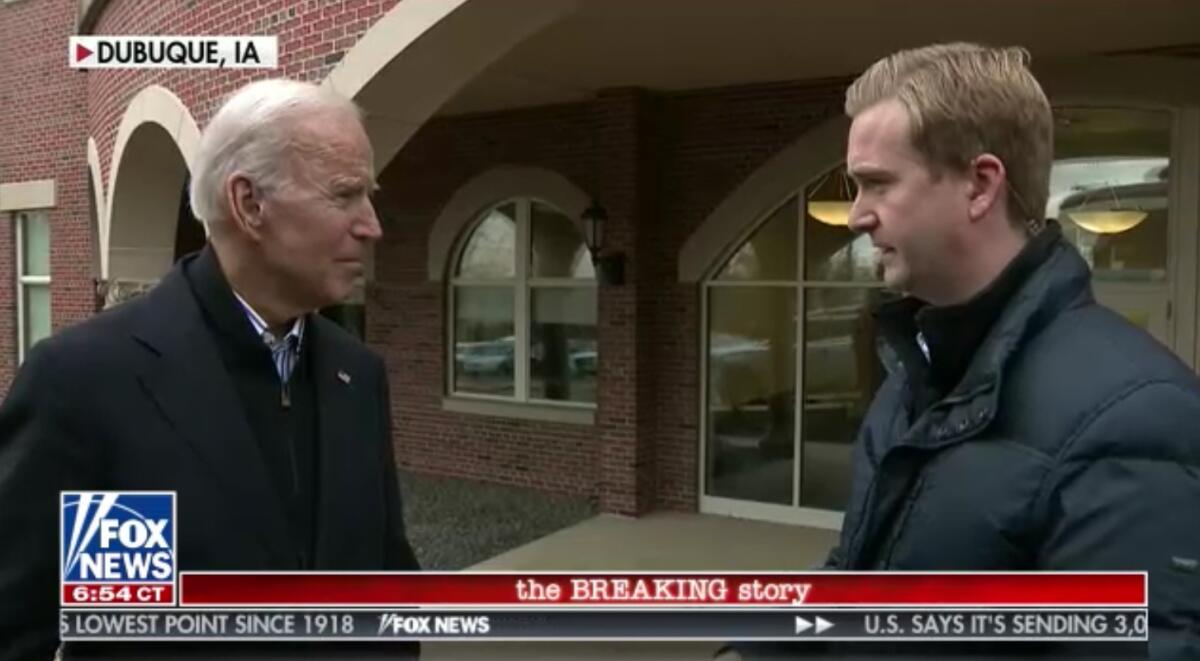The COVID-19 pandemic is forcing networks to reinvent TV election coverage

- Share via
In the 72 years that television has covered national elections, there has been one constant on the screen — wall-to-wall people.
Jammed nominating convention halls and flesh-pressing rallies are the signature images of every presidential campaign. Election night — the Super Bowl for TV news organizations — is a marathon vote-counting jam session where anchors, reporters and commentators flow through the studios into the wee hours of the following morning.
But those scenes familiar to political junkies will be obliterated by the coronavirus crisis that has upended every aspect of American life. Social distancing has already changed the look of TV news, as many journalists have been broadcasting from their homes since mid-March, and it will drastically alter how viewers experience coverage of the 2020 race for the White House as it heads into the home stretch.
“It’s all going to look a lot different without us even knowing what different is going to look like,” said Rick Klein, political director for ABC News.
Calibrating the number of personnel needed to cover events while being mindful of health protocols has become the focus of TV news executives as they try to plan for what they consider the most consequential presidential election in decades.
“This was already going to be a fascinating and complicated election in all sorts of ways,” said Sam Feist, Washington bureau chief for CNN. “But COVID is what really changed it.”
The parties have scaled back their nominating conventions, which provide cable news outlets with some of their largest audiences of the year. The Republican National Committee cancelled its plans to have President Trump accept his nomination in Jacksonville, Fla., on Aug. 27.
While some party meetings will be held in Charlotte, N.C., networks still don’t have a schedule for the week’s events or a location for the nominee’s traditional Thursday night speech — though Trump has suggested he could deliver it from the Oval Office.
Presumptive Democratic nominee Joe Biden will speak from Milwaukee, Wis., on Aug. 20 as planned, but most of the other speakers during the three preceding days will be seen from remote locations. If there is any confetti, balloons or signs, they will likely show up in Zoom or WebEx meeting boxes on the screen.
Networks typically send as many as 300 staffers to cover a convention, with anchors, reporters, technical crews, makeup artists and other support teams descending on the designated city. Those numbers will be significantly lower this time around. Remote trucks with control rooms that usually line up outside of an arena will be missing as most news operations produce their coverage from their headquarters in New York or Washington.
Cherie Grzech, vice president of the Washington bureau and politics for Fox News, said she is likely to have three or four reporter-producer teams on the ground, compared to as many as nine for a typical convention.
“I think we have to find the balancing moment of being there and giving a firsthand account while at the same time keeping our staff safe,” Grzech said.
While convention plans are still being formulated by the political parties — the Democrats are scheduled for Aug. 17 -20 while the Republicans convene the following week — journalists assigned to cover the gatherings can only prepare to deal with the unknown. But they know they won’t be in the scrums of conventions past.
CBS News political correspondent Ed O’Keefe had imagined himself in the footsteps of the network’s broadcast legends Bob Schieffer and Ed Bradley.
“It’s bittersweet because I wanted to be one of those guys with a headset and a long microphone running around the floor of a basketball arena,” he said. “The sweet part is no matter what it looks like, it’s going to be historic.”
The look of election night on Nov. 3 promises to be even more of mystery as every TV news organization believes the increase in mail-in voting that is expected due to the pandemic will make the process of tabulating results and calling state-by-state winners to reach 270 electoral votes a slow and laborious process. Anchors and reporters are already referring to it as “election week.”
Only twice in the 12 presidential elections since 1972 have viewers gone to bed without knowing the winner of a presidential race. In 2020, it’s almost a certainty to happen again.
“I have told my wife, my family and my friends that election night might be the beginning of a days- or weeks-long saga, potentially,” O’Keefe said. “I think Americans have to prepare mentally and emotionally for that.”

Every major TV news organization has a “decision desk,” where statisticians and political analysts look at historical voting trends, polling data and the actual vote count as it comes in before calling a winner in each state.
During election coverage, the dozen or more members of decision desk teams are typically packed into a conference room where they can quickly deliberate and make calls based on the data they have.
Social distancing will break up the traditional cluster of number crunchers.
Network news executives say they are now rethinking the decision desk set-up, with at least one planning to move the personnel involved to a larger facility where they can still be on site together rather than risk having the whims of technology slow down the process of calling races. They may have to work in shifts as well.
“It’s not ‘What hour of the night do we need you to stay around?’” Grzech said. “It’s ‘Let’s plan for staying for the full week and what we’re going to do at certain hours when people have to sleep.’”
There are also scenarios where viewers will have to endure prolonged legal battles similar to the monthlong struggle that occurred in 2000, when the razor-thin margin of the vote in Florida led to a recount in the race between George W. Bush and former Vice President Al Gore. The U.S. Supreme Court ultimately settled the dispute over the recount in favor of Bush, five weeks after votes were cast.
“You could have hanging chads all over the country,” said CBS News President Susan Zirinsky, referring to the iconic image of the Florida recount.
Network news executives know they may be in for an endurance test. Zirinsky said Norah O’Donnell will anchor the “CBS Evening News” from the network’s election night set until a winner is declared. CNN’s Feist expects to have relief ready for John King, who stands before the network’s “magic wall” that shows the distribution of electoral votes throughout the count until a candidate reaches 270.
“I don’t think there is a person alive here who knows how election night will play out,” Feist said. “We always have plans for every eventuality.”
President Trump has already publicly tried to raise the potential for fraud through mail-in voting, although the number of such confirmed cases is infinitesimal. It’s why networks are also gearing up to track the potential legal challenges that could come after the vote.
NBC News has assembled a team named Vote Watch, made up of investigative correspondents and legal experts who specialize in election law and voting rights.
“We had a version of this team in the last election cycle, and we’ve dramatically expanded it and gotten into work early this cycle because we believe that these issues will be central to the outcome,” said NBC News President Noah Oppenheim.
The pandemic has also presented unexpected challenges for correspondents covering Biden. While Trump has the forum of the White House to connect with the press every day if he wants, Biden has limited his travel, doing most of his campaign events remotely from his Delaware home with occasional trips to Pennsylvania.
Fox News correspondent Peter Doocy wore out a suitcase with a lifetime guarantee as he tailed Biden all over the country during the primary campaign in 2019 and the pre-pandemic months of this year where he was able to regularly lob questions at the candidate. But his replacement luggage, barely used, is sitting in the closet of his Washington apartment.

“It’s a lot different than what we became accustomed to,” Doocy said. “When the primary started there were so many candidates and everybody was so eager to talk in order to stand out. Now there’s just one and it is difficult to get close enough to get his attention.”
The lack of public events for Biden makes it more difficult to gauge voter enthusiasm.
“It’s impossible to know in real time what people think about what he is saying as opposed to pre-pandemic, where you can just turn around and there were a couple of dozen people there,” Doocy said. “Now it’s an empty parking lot.”
Networks were criticized for devoting so much time to Trump’s 2016 campaign and the carnival atmosphere it created. A study by the Shorenstein Center on Media, Politics and Public Policy at Harvard University found that during the period from August to November 2016, Trump received 15% more coverage than his Democratic opponent Hillary Clinton.
Avoiding a similar imbalance in 2020 could be a challenge, as correspondents say there is a paucity of opportunities to question Biden as the public health crisis has limited his public appearances.
“I do know if Biden were doing more in-person events we would be taking more of them live,” Doocy said. “It would certainly make it a lot easier around deadline. We definitely don’t have as much to work with as cycles past.”
More to Read
Inside the business of entertainment
The Wide Shot brings you news, analysis and insights on everything from streaming wars to production — and what it all means for the future.
You may occasionally receive promotional content from the Los Angeles Times.











